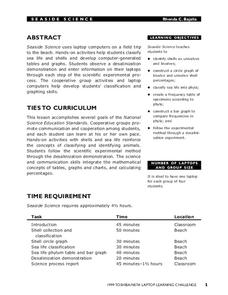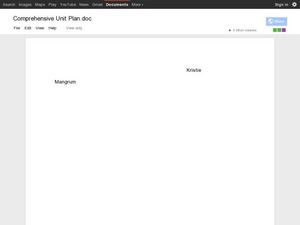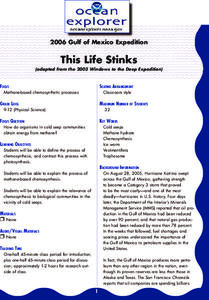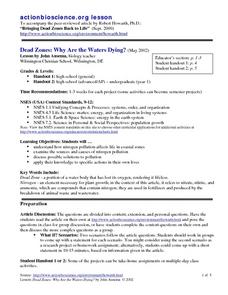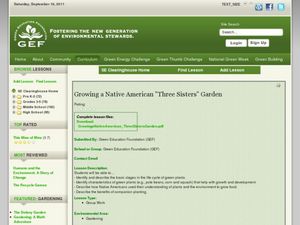Curated OER
Life Processes
Students identify life processes and create their own creature. In this creative science instructional activity, students identify an organism's life processes and categorize them into groups. They then create their own creature and...
Curated OER
Life in the Crystal Palace
Marine biologists research sea ice communities. Assign some groups to construct paper models of sea ice communities in winter, and some to construct models of them in summer. The instructional activity is simplistic, but the Internet...
NOAA
Watch the Screen!
Can a sponge cure cancer? Life science pupils visit the drugstore under the sea in the fifth lesson of six. Working groups research the topic then get hands-on experience by testing the inhibiting effects of several plant extracts...
Curated OER
Compare and Contrast Night to Life is Beautiful
After reading Elie Wiesel's Night, watching the movie Life is Beautiful, and researching World War II, class members write a comparison essay on the book and film. This includes a prior knowledge activity, discussion in whole and small...
National Wildlife Federation
Links in the Chain of Life
A small little ant can have a large impact on its ecosystem. Young researchers explore the different species that live in a plains ecosystem. They find the characteristics of several species and then compare species to determine how...
Curated OER
My Friend, the Volcano
Working in cooperative groups, young scientists research and report on how undersea volcanic activity may benefit marine ecosystems. There are many links to websites that you can use to stimulate curiosity or for pupils to use for...
NOAA
Deep-Sea Ecosystems – Life is Weird!
A pool of brine in the deep sea can be up to four times as salty as the surrounding sea water. The deep sea ecosystem relies on chemosynthesis and the organisms that live there are often strange to us. The lesson plan focuses on...
NOAA
It's a Roughy Life
Scientists recently discovered several previously unknown species at the Bear Seamount off the coast of New England. Scholars research these new species — benthopelagic, benthic, and seamount fish — and find out what makes them...
Curated OER
Seaside Science
Learners research sea life using laptop computers. In this sea life lesson, students participate in a field trip to the beach and enter observations into their laptop computers. Learners classify shells and sea life.
Curated OER
The Life Cycle of the Mealworm
Fourth graders provide a habitat for live mealworms and observe their life cycle. In this animal life cycle and scientific inquiry lesson, 4th graders create a habitat for a live mealworm and observe and record related data as it grows....
Curated OER
Science Fiction Stories
Learners write a story. In this genre lesson, students read a science fiction story and discuss its characteristics. Learners brainstorm a list of things that if scientifically changed would alter the way we live our lives. Students...
National History Day
Helping Life and Aiding Death: Science, Technology, and Engineering at Work during World War I
Science, engineering, and United States history? Pupils research collections of artifacts from the Smithsonian to learn about historical scientific innovations. At the end of the lesson, they write an essay to discuss technology's...
Curated OER
This Life Stinks
Chemosynthetic communities of cold seep areas are considered in this instructional activity. Working in collaborative groups, marine biology or oceanography learners research and prepare a report about oxidation-reduction reactions...
Curated OER
Life is Weird
Separate your science class into small groups and assign each a specific deep-sea organism to research. The class will learn about all of the organisms as each group presents their assigned animal. Following their presentations, you can...
Curated OER
The Long Road to Coffee
Students discover how coffee is processed from a plant, to a drink. In this life cycle lesson, students study that cells and organisms go through a cycle of growth and change. Students organize picture cards, illustrate how coffee...
Curated OER
Dead Zones: Why Are the Waters Dying?
Students investigate the effects of pollution on marine ecosystems. They read and discuss an article, identify the effects of pollution on marine life, conduct research on local nutrient pollution, and conduct local water quality studies.
American Museum of Natural History
They Glow!
Would you believe marine animals can make their own light? An online resource describes the process of bioluminescence and how animals in the ocean use it to survive. The lesson features a catchy tune that describes the behavior of ocean...
Curated OER
Our Dinopals with WordArt
Elementary schoolers use the writing process steps to write a descriptive paragraph about a fictional dinosaur. Using a tech tool lesson, they create a graphic title for the paragraph. A nice blending of technology with "old-fashioned"...
Curated OER
Growing a Native American "Three Sisters" Garden
Young scholars explore plant life by creating their own gardens in class. In this food growing lesson plan, students discuss the types of gardening methods Native Americans used in order to keep healthy. Young scholars plant corn seeds...
Curated OER
Effects of Oil Spills on Environment and Marine Life
Students explore oceanography by conducting an environmental experiment in class. In this oil spill lesson, students discuss the human need for oil and what is at stake when we drill for oil in our oceans. Students read a book in class...
Curated OER
Dinosaurs
Students are introduced to the various types of dinosaurs and write in their journals about their favorite one. After listening to a story and watching a filmstrip, they color a few pages in their Dinosaur Friends Book. They also examine...
Intel
Insects: The Good, The Bad, The Ugly
What would the world be like with no insects? Ponder this question using a research-based STEM unit that encourages scholars to investigate insects from both a beneficial and hazardous perspective. They learn about insect behaviors,...
Curated OER
Decomposition, Soil, and Life Cycle Research
Students conduct background research on the decomposition process, soil composition, and the life cycle using the resources provided for Internet searches. They work in collaborative groups to research topics as a particular plant, soil...
Curated OER
The Life Cycle of the Butterfly
Second graders study the life cycle of a butterfly by observing metamorphosis taking place in a butterfly pavilion. Students illustrate their understandings of the body parts of a caterpillar and butterfly, as well as the life cycle,...










